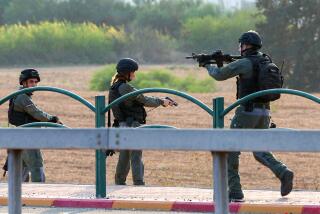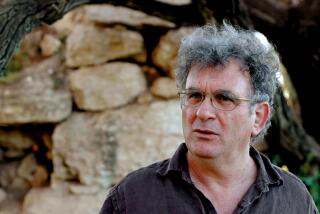American Troops in Saudi Arabia
- Share via
I was dismayed by the tone of Abdelrahman Munif’s “The Bomb Was an Act of Despair” (Commentary, July 3). The bomb attack on U.S. airmen in Dhahran illustrates that the Arabs still see the U.S. as an imperialist power bent on controlling their destiny. This can be seen in Munif’s reference to Israel, which the Arabs have always considered a tool of Western oppression and domination.
Munif heaps blame on the U.S. for doing what any nation should do, namely, protect its vital economic national interests. During the Gulf War, the Saudis allowed “infidels” (American troops) on their soil in the name of protecting the Islamic holy land. Because of these infidels, the Saudi monarchy was able to stave off an Iraqi invasion. Moreover, the Saudi royal family continued to fill its coffers with profits made from oil that the U.S. protected.
The Arab states, and the Gulf principalities in particular, should follow the example of the European Union. They need to learn the lessons of democracy. Arab nations cooperating could form a formidable trading bloc that would indeed make them equal partners with the United States.
MICHAEL WEISER
Northridge
* Munif’s succinct and most insightful assessment of the Middle East political climate should be mandatory reading for every American political leader. He has boiled down into a very small space the essence of the origin of most Middle East problems we have faced in the last 40 years.
While some Americans will not agree with the entirety of Munif’s statement, I feel that he has proffered a most valuable service to the American people with his analysis.
DAVID M. CORIATY
Cerritos
* Re “The Deadly Rage Against Riyadh’s Repressive Regime,” Opinion, June 30:
Charles William Maynes is correct that U.S. troops are regarded by many in Saudi Arabia as infidels on Arab lands.
“Land for peace” rewards Islamic terrorism with an additional Arab Islamic potential state.
Getting U.S. forces out of a place where they are regarded as infidel enemies (or dropping “the Clinton administration’s policy of dual containment against both Iran and Iraq--a policy supported by no other major power”), like moving Israel out of its own 3,400-year-old heartland, is a reward for terrorism.
But is it in fact a peace process in Saudi Arabia, Israel or elsewhere to “dry up” support for terrorism by rewarding it, and, as in the case of Israel, creating an additional state from which the terrorism can be launched?
Maynes is certainly right that the sources of outrage giving rise to terrorism must be examined dispassionately. But “dispassionately” means to be very sure that deterrence against attack is not jeopardized, while appeasing the “outrage” where legitimate.
LEONARD HORWIN
Beverly Hills
More to Read
Sign up for Essential California
The most important California stories and recommendations in your inbox every morning.
You may occasionally receive promotional content from the Los Angeles Times.













